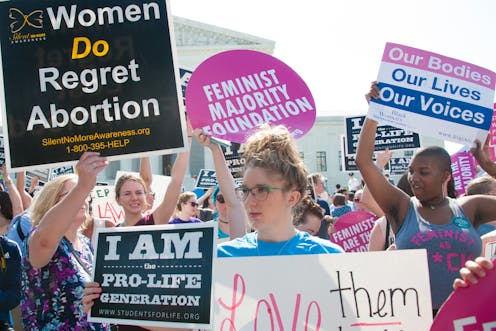Abortion freedom of speech battle heading to the Supreme Court
Under a California law, faith-based crisis pregnancy centers must post signs with information about family planning services. The centers say it violates their First Amendment rights.

Whether you’re for abortion or against – can the state force you to say anything about it? What about posting a notice with information for the other side? This year, the U.S. Supreme Court must decide.
A 2015 California law, the Reproductive FACT Act, requires faith-based “crisis pregnancy centers” that don’t offer abortions to post notices about state family planning and pregnancy-related services. In National Institute of Family and Life Advocates v. Becerra, these centers argue that the rule violates their First Amendment’s guarantee of freedom of speech.
The case will be argued sometime this spring and the Court will render a decision by late June.
I am a constitutional law professor who has written extensively on the First Amendment and litigated a number of important First Amendment cases. In my opinion, the California law does not violate the First Amendment. It doesn’t compel the clinics to say or not say anything, only to post truthful information provided by the state.
Facts about FACT
CPCs are faith-based pregnancy care centers that try to discourage women from seeking abortions. There are nearly 200 licensed and unlicensed crisis pregnancy centers in California.
Under the FACT Act, all these facilities must post notices advising clients that the state has public programs that provide immediately available family planning services, including FDA-approved methods of contraception, prenatal care and abortion. Notices must also include the phone number of the county social services office.
The law’s stated purpose is to “ensure that California residents make their personal reproductive health care decisions knowing their rights and the health care services available to them.”
When the California Legislature enacted the law, it found that crisis pregnancy centers “pose as full-service women’s health clinics, but aim to discourage and prevent women from seeking abortions.” The centers engaged in “intentionally deceptive advertising and counseling practices that often confuse, misinform, and even intimidate women from making fully-informed, time-sensitive decisions about critical health care.”

First Amendment rights
The crisis pregnancy centers say that the FACT Act forces them to convey information that they don’t want to share, thus violating their First Amendment right to refrain from speaking.
The state contends that the requirement is a reasonable regulation of licensed medical facilities and does not interfere with the centers’ First Amendment rights. Federal courts in California have also held that FACT does not violate the centers’ First Amendment rights.
The right to refrain from speaking is an important one. For example, a state cannot compel Jehovah’s Witnesses to display the part of their automobile license plate containing the state motto “Live Free or Die,” because the motto violates their belief in eternal life. A labor union cannot use fees imposed by law on nonunion members of the bargaining unit to advance ideological causes favored by the union.
But First Amendment rights are not absolute. Requiring a regulated medical facility to post government-mandated information designed to enable women to be fully informed about reproductive choices would not, in my opinion, be forcing the facility to say anything. Crisis pregnancy centers are perfectly free to try to persuade women not to have an abortion even in the presence of information on family planning services.
The state has an important interest in ensuring that women have all the information necessary to make an informed, time-sensitive decision about their pregnancy. This is all that FACT does.
Refraining from speaking
In 1992, in upholding a woman’s constitutional right to have a safe and legal abortion, the court also held that the state could impose reasonable regulations on abortion providers, so long as the regulation did not impose an undue burden on the woman’s right to have an abortion.
On this basis, the Court upheld a requirement that before performing an abortion, the physician had to inform the woman of the availability of printed materials published by the state describing the fetus.
These materials provided information about medical assistance for childbirth and child support from the father, as well as a list of agencies that provide adoption and other services as alternatives to abortion. The woman had to certify in writing that she had been informed these materials were available and that she had been provided them if she chose to view them.
This requirement was designed to discourage women from having an abortion. Abortion providers argued that this violated their right to refrain from speaking, but the Court summarily dismissed this in one paragraph:
“To be sure the physician’s First Amendment rights not to speak are implicated but only as part of the practice of medicine subject to reasonable licensing and regulation by the state. We see no constitutional infirmity in the requirement that the physician provide the information mandated by the state here.”
For the same reason there is no constitutional infirmity in FACT’s required notices. All the center is required to do is to post the information. It is not required to say anything.
Overturning precedent
What if the Supreme Court does hold that the First Amendment precludes California from requiring crisis pregnancy centers to post these notices?
If so, it would logically follow that the First Amendment also prevents a state from requiring that abortion clinics post information about the availability about alternatives to abortion. The Court would have to overrule its earlier decision. The state could no longer require that clinics post information that would enable pregnant women to make an informed choice about whether or not to continue their pregnancy.
But it is very rare that the Court overrules a prior decision, and the Court is not likely to do so in this case. The Constitution enables the state to require that pregnant women seeking medical advice and assistance with their pregnancy have complete and accurate information so that they can make a fully informed choice. That is what this case is all about.
Robert A. Sedler does not work for, consult, own shares in or receive funding from any company or organisation that would benefit from this article, and has disclosed no relevant affiliations beyond their academic appointment.
Read These Next
Hezbollah − degraded, weakened but not yet disarmed − destabilizes Lebanon once again
Hezbollah’s entry into the current war followed the killing of Ayatollah Ali Khamenei. The group has…
Congress once fought to limit a president’s war powers − more than 50 years later, its successors ar
At the tail end of the Vietnam War, Congress engaged in a breathtaking act of legislative assertion,…
Housing First helps people find permanent homes in Detroit − but HUD plans to divert funds to short-
Detroit’s homelessness response system could lose millions of dollars in federal funding for permanent…






